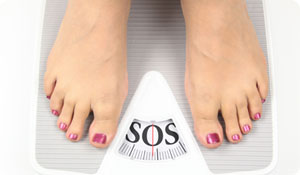
Scientists from the University of Chicago Medical Center have showed that weight gain is not just due to excessive caloric intake, but also the interaction between intestinal bacteria and the body's immune response.
"Diet-induced obesity depends not just on calories ingested but also on the host's microbiome," said the study's senior author Yang-Xin Fu, MD, PhD, professor of pathology at the University of Chicago in a press release. A microbiome is the total of all microbes living in, and on, our bodies. Previous studies have revealed the differences in gut microbiomes in lean and obese people.
Though stomach bacteria has been in the spotlight before as a possible cause of obesity, this new research shows promise in the ability to alter the bacterial mix as a treatment for obesity—by either regulating gut flora or manipulating the immune response.
Measuring Microbes and Immunity
In the study, published in the journal Nature Immunology, scientists focused on the interactions between diet, intestinal bacteria, and the immune system to reveal some of the mechanisms that regulate weight gain.
According to the press release:
Researchers compared normal mice with mice that have a genetic defect that renders them unable to produce lymphotoxin, a molecule that helps to regulate interactions between the immune system and bacteria in the bowel. Mice lacking lymphotoxin, they found, do not gain extra weight, even after prolonged consumption of a high-fat diet.
On a standard diet, both groups of mice maintained a steady weight. But after nine weeks on a high-fat diet, the normal mice increased their weight by one-third, most of it fat. Mice lacking lymphotoxin ate just as much, but did not gain weight.
The high-fat diet triggered changes in gut microbes for both groups. The normal mice had a substantial increase in a class of bacteria (Erysopelotrichi) previously associated with obesity and related health problems. Mice that lacked lymphotoxin were unable to clear segmented filamentous bacteria, which has previously been found to induce certain immune responses in the gut.
To confirm the role of stomach bacteria in weight gain, researchers performed fecal transplants in mice raised in sterile environments.
The results: Mice who received bacteria that made the molecule lymphotoxin gained weight quickly. The mice that received bacteria lacking lymphotoxin gained much less weight for a period of about three weeks, before their immune system normalized the gut flora.
More research is needed before a clinical application is available. Such treatments may be administered through vaccines or antibiotics.
The biggest challenge: There are more than 500 strains of bacteria in the stomach. According to the researchers, finding "the precise microbes that promote such weight gain and the specific host responses that foster their growth need to be better established."
Source:
Manipulating the Microbiome Could Help Manage Weight. Eurekalert.org August 2012. Web. http://www.eurekalert.org/pub_releases/2012-08/uocm-mtm082412.php





